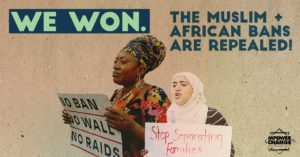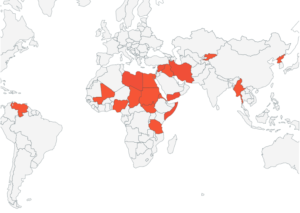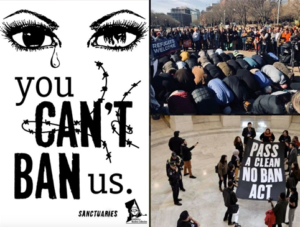
By Claire Downing (Program Officer) and Alison Kysia (Grant Writer)
Updated on April 22, 2021.
On April 21st, the House once again passed the NO BAN Act 218-208. Advocacy organizations are now shifting their focus to the Senate.
As the U.S. welcomes a new administration, RISE Together Fund celebrates President Biden’s executive order to immediately end the Muslim & African Ban. This cruel policy was the Trump administration’s first official decree, illustrating the administration’s commitment to white supremacy, Islamophobia, and xenophobia. There were multiple iterations of the Ban, as the administration continuously added more countries to the list, and, disappointingly, the Supreme Court gave the Ban legal cover.
The RISE Together Fund was founded in 2008 to challenge the criminalization of Muslims, Arabs, Middle Easterners, Sikhs, and South Asians in the post-9/11 era. The Muslim & African Ban was one of our worst fears realized. Over the past four years, RTF, our funders, and our grantees mobilized against these dehumanizing and discriminatory policies. And while we are so glad to see the law revoked, the work is not nearly complete.

Supporting the Leadership of Directly-Impacted Communities
RTF and our affiliated 501(c)(4) organization, the RISE Together Action Fund (RTAF), supported directly-impacted communities to lead local and federal legislative advocacy and grassroots community engagement efforts to fight the Ban. RTF and RTAF played a central role in national and regional mobilization efforts to challenge the Ban’s impacts on refugees and immigrants from specified countries, granting over half a million dollars to support Muslim, African, Arab, Middle Eastern, and South Asian organizers.
Early on in the fight against the Ban, RTF and RTAF supported field leaders with convening grants, campaign strategy and mobilization consultations, and technology funds. Some of the impacts of our support include:
In addition to providing funding and strategic movement-wide coordination, RTF plays a critical role in educating the larger philanthropic community about the work of Muslim, African, Arab, Middle Eastern, Sikh, and South Asian social justice leaders. Shortly after the Ban’s passage in 2017, RTF held a call with over 100 funders to inform them about the Ban’s impact and how the field was responding. RTF continued to educate and align funders on the impact of the Bans, and produced several written resources to both keep philanthropy up to date on key developments, and also call for more philanthropic support for the field’s needs as families continued to be separated, occasionally to tragic end. Key funding partners included Open Society Foundations, the Open Society Policy Center, Ford Foundation, the Immigration Litigation Fund at Borealis Philanthropy, the Pop Culture Collaborative, and Four Freedoms Fund.
As years passed after the Ban was enacted, and the initial shock and public outcry faded, it was increasingly difficult to drive money to the field to continue fighting the Ban. This may have been due to the cacophony of urgent needs facing progressive organizing. But the fact remains that in light of the national and international impacts of the Muslim & African Ban on people of color, we still have a lot of work to do to educate philanthropy on the value and potential of investing in social justice leaders in Muslim, Black Muslim, Arab, Middle Eastern, Sikh, and South Asian communities, who continue to be undervalued in mainstream philanthropy.

Next Steps to Redress the Damage Done by the Ban
For four years, Muslim, Arab, Middle Eastern, African, South Asian, and allied communities have fought in the courts, in the media, and on the streets to repeal the Muslim & African Ban and pass the NO BAN Act. January 20, 2021 marks the next chapter of an ongoing process, because we must repair the damage done and protect all communities from ever letting something like this happen again. Movement organizers need support to push back against extreme vetting, Temporary Protected Status (TPS) denial, and other anti-immigration policies. To ensure no similar policy is able to be enacted under future administrations, the Congress must pass the NO BAN Act and President Biden must sign it into law.
President Biden’s Executive Order to rescind the Ban also includes steps to provide redress to individuals and families affected by the policy. For example, the State Department must produce a report within 45 days offering safeguards to ensure that people whose visa applications were denied under the Ban are not further discriminated against in future visa requests. Field organizations including CAIR-San Francisco, Asian Americans Advancing Justice-Asian Law Caucus, and others, are providing support to individuals and families seeking guidance about how to reconnect with family members who were denied entry under the Ban.
On this note, we feel it is important to share some of the key lessons we have learned throughout our support to grassroots organizations fighting the Ban. Four years of funding and funder mobilization to oppose the Ban have yielded the following three takeaways:
Support grassroots mobilization and policy change.
While early funding after the first Ban’s implementation in January 2017 largely focused on litigation, RTF took a comprehensive approach to pushing back against the Ban. Our strategy recognized the need to shift public opinion on how Muslims, Black immigrants, and other people of color are securitized under the guise of national security, foreign policy, and immigration. To that end, RTF funded a variety of grassroots organizing efforts to push back against the Ban, including demonstrations, public education efforts, and arts and culture-based efforts. (Read more about our grants here.) RTF’s (c)(4) sister organization, RTAF, funded over $100,000 in lobbying and legislative advocacy efforts to pass the NO BAN Act and rescind the Muslim/African and refugee bans, mostly focused on local and state-based grassroots efforts.
Elevate and center Black-led perspectives and work.
From the outset, the various iterations of the Muslim & African Ban focused on the most vulnerable, from blocking citizens from war-torn Yemen and Libya to preventing those facing life-threatening diseases from entering the country for treatment. But the expansion of the Ban in 2020 to include mostly Black African countries (in addition to Somali and Sudan, on the original list) made it clear that this wasn’t just a Muslim Ban, but an African one, too, and that the intent was to block Black people and people of color from entering the country. While the original Ban affected 135 million people in 7 countries, the expanded ban affected nearly a quarter of the African continent’s 1.2 billion people.
As part of our commitment to increasing support for Black-led work, we have worked with the RISE Organizing Team and our grantee ReThink Media to incorporate Black-led groups affected by the Ban into monthly calls and outreach. This led to more informed and nuanced messaging from the field on the anti-Black nature of the Ban, and elevated new partnerships among Black-led and Muslim, Arab, and South Asian groups. RTF’s February 2020 blog post, “Standing in Solidarity to Fight Anti-Black Racism,” points to the need for recognizing how interwoven our inequities are and the importance of working in tandem to further understand the struggle of the most marginalized and dismantle our unjust systems.
Investments in communications capacity makes a difference.
RTF has invested in a shared communications hub for the field since 2010 through grants to ReThink Media’s Rights and Inclusion team. In addition to ReThink’s messaging on the Ban, their op-ed placement and ghostwriting on the Ban’s impacts have pressured public officials to take up individual cases, leading to some relief for impacted individuals. For example, ReThink’s work with the Courier Journal in Kentucky, highlighting the plight of an Iranian woman denied entry into the U.S. for life-saving medical care, led to the woman’s visa being approved so she could receive medical treatment. This kind of media engagement is a powerful tool to create awareness, apply political pressure, and ultimately create change.
Executive Order, “Proclamation on Ending Discriminatory Bans on Entry to The United States:”
“The United States was built on a foundation of religious freedom and tolerance, a principle enshrined in the United States Constitution. Nevertheless, the previous administration enacted a number of Executive Orders and Presidential Proclamations that prevented certain individuals from entering the United States — first from primarily Muslim countries, and later, from largely African countries. Those actions are a stain on our national conscience and are inconsistent with our long history of welcoming people of all faiths and no faith at all.
Beyond contravening our values, these Executive Orders and Proclamations have undermined our national security. They have jeopardized our global network of alliances and partnerships and are a moral blight that has dulled the power of our example the world over. And they have separated loved ones, inflicting pain that will ripple for years to come. They are just plain wrong.”
The No Muslim Ban Ever Campaign has put out suggested talking points and a social media toolkit.
Proclamation on Ending Discriminatory Bans on Entry to The United States.
UndocuBlack Celebrates the Extension of DED for Liberia.
‘Psychological trauma and stress’: The lasting impact of the ‘Muslim ban’ (NBC)
Article: Biden ended the Muslim travel ban. A much tougher problem persists.
Listen: Legacy Of President Trump’s Travel Ban Will Be Hard For Biden To Erase (NPR)
Listen: Muslim And African Communities Affected By Travel Ban See Biden’s Reversal As A Sign Of Hope (NPR)
Article: Activists Praise Biden’s Reversal of Trump-Era ‘Discriminatory’ Travel Ban. But the Work Isn’t Over Yet.
Watch: Life Under the Travel Ban: #CookingUnderTheBan
Understanding Trump’s Muslim Bans, No Muslim Ban Ever, updated March 2019: this includes a useful grid outlining the multiple iterations of the Ban.
RTF Blog Post, July 2020: The Muslim/African Ban: Still in Place, Still Separating Families. Here’s What Philanthropy Needs to Know.
RTF Blog Post and Video: #NoMuslimBanEver